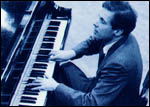| |
|
|
|||||||||||||||||||
|
Hear Samples of Glenn Gould's Performances of the Goldberg Variations Happy Birthday, Bach! By Rex Levang March, 1999
EVERY MONTH MPR'S MUSIC DEPARTMENT asks a different individual to give us a list of five compact discs of his or her choosing. The criteria are strictly personal, and the choices cover a pretty wide gamut. But several discs come up again and again: Carlos Kleiber conducting Beethoven symphonies; Miles Davis and colleagues on their album Kind of Blue; and Glenn Gould's 1955 recording of Bach's Goldberg Variations. What makes this the most famous Bach recording ever made? It doesn't hurt that it's a brilliant performance of a musical masterpiece, but it's been helped out by some other factors. To start with, the glamor of the soloist - in Gould's case, a kind of anti-glamor glamor, but no less potent for all that. Classical performers, compared with their counterparts in pop and rock, are a boring, monochrome bunch. They play the same music, have the same opinions, behave the same at concerts. It doesn't take much originality to stand out in this crowd and Gould had it by the bushel. He was reclusive, eccentric, obsessive. He avoided some composers (Chopin, Rachmaninoff), trashed others (Mozart). He had some notorious mannerisms: crouching over the keyboard, singing to himself during recording sessions. Most famously, at 31, he quit giving recitals, proclaiming that it was through recordings, not public performances, that musicians would reach their audiences in the future. As usual in this kind of relationship, the public, feeling itself ignored, only grew more fascinated.
Sample Gould's Goldberg Variations And lastly the brilliance and confidence of the music-making itself. Let's celebrate Bach's birthday by looking at just a few samples: (For streaming audio help, see How to Listen.) Aria and Variation 1. The theme that the Variations are built
on. Gould recorded the Aria twenty times before he was satisfied he
had struck the right note of simplicity. The following variation Gould
described as a "precipitous outburst ... which abruptly curtails
the preceding tranquility."
Variation 2. The characteristic sound of Glenn Gould at the
piano - alert, incisive, rhythmic.
Variation 18. One of the things that made Gould a great Bach
player was his ability to sort out different strands of counterpoint
effortlessly.
Variation 20. Compound virtuosity. Music that's tricky at the
double keyboards of Bach's harpsichord, trickier when played on the
single one of the piano.
Variation 25. An intense, inward movement traditionally nicknamed
the "Black Pearl." Gould probably would have hated the nickname,
but he honors some of its spirit nonetheless.
Recording Information It is not the only Gould recording of the Goldbergs. In 1981, the year before his death, Gould made another studio recording of the work (CBS 37779). In addition, in his early years he performed it in concerts and broadcasts, and tapes of these performances have since shown up as commercial recordings, sonic warts and all. |
|||||||||||||||||||||
MPR Home | News | Music Collection | Events | Radio Listening | Your Voice | About Us | Support Us | Help ©2005 Minnesota Public Radio | Terms of Use | Privacy Policy |

